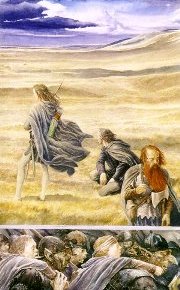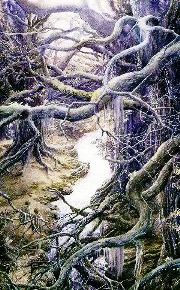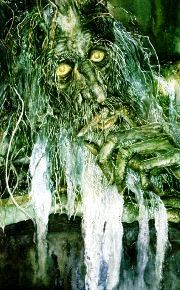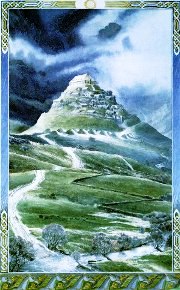Tolkien Calendar: The Great Years
February 27, 3031
27 February 2006 11:05:42Aragorn and crew reach the East wall of Rohan, Éomer sets out from Eastfold

- This is a day where it appears that little happens. But, in reality, the events of this day are flowing to convergence.
This morning, at first light, after pursuing the Orcs all night, Legolas, Gimli and Aragorn reach the East wall, the cliffs that mark the eastern border of Rohan. As they pause Legolas remarks upon an eagle that he can see soaring high above them. The eagle then takes off at great speed to the north. Aragron wonders if it is the same eagle he saw yesterday, before the three left Amon Hen and wonders at its business. Off in the distance they can see the orcs, some 12 leagues ahead, still moving at great speed. Taking no rest, the hunters follow the same path the orcs took down the cliffs and continue the chase.
They are not far inside the borders of Rohan when Aragorn discovers Pippin's short dash to freedom and the leaf the he let drop as a message. This gives the trio renewed hope and energy to keep up their race across the vast plains of Rohan.
At the same time, Eomer gathers his Eored, the riders of his house, and sets off from Eastfold in pursuit of a band of Orcs that he had rumor of yesterday.
Soon these hunters of Orcs will find their paths crossing. In the future much will depend upon this outcome of this meeting.
Images © "Chase of Aragorn, Legolas and Gimli" by Alan Lee.
February 28, TA 3019
28 February 2006 08:38:57Categories: Tolkien Calendar
Éomer overtakes the Orcs just outside Fangorn Forest.

Perhaps this appears to be a day of little significance in the grand scheme of things in the War of the Ring, but Tolkien seems to attach great significance to even the smallest details. Théodred, son of the King of Rohan, has just been slain. Saruman discounts the loyalty and the effectiveness of his younger cousin. Remember, Éomer was only 28 at the time.
Today, Éomer defeats the Orcs on the edge of Fangorn. Yet another blunder of Saruman's is that he forgets about the Ents and the powerful force that they can be when awakened. Tolkien begins to pull together all of his resources for Saruman's defeat in Rohan, and it begins today with a small and rather insignificant skirmish just outside Fangorn.
Images © "Fangorn Forest" by Alan Lee.
February 29, TA 3019
28 February 2006 18:33:54Categories: Tolkien Calendar
Meriadoc and Pippin escape and meet Treebeard. The Rohirrim attack at sunrise and destroy the Orcs. Frodo descends from the Emyn Muil and meets Gollum. Faramir sees the funeral boat of Boromir.

Shippey says that, in The Lord of the Rings, Tolkien used an old literary technique called 'interlacing', that is, the weaving together of plot elements. Today we see this technique used most effectively. We learn of these several events by reading five different chapters in LOTR, spaced through the two books of The Two Towers: 'The Riders of Rohan', 'The Uruk-hai', and 'Treebeard' in the third book, and 'The Taming of Smeagol' and 'The Window on the West' in Book Four. That's a span of fifteen chapters. Why is this so effective? Because we readers experience these events somewhat as the Fellowship were likely to have experienced them, disjointed, not knowing the big picture, feeling the same anxiety for the other characters. Frodo didn't know that Merry and Pippin were the prisoners of the Orcs. No one could have predicted the meeting with Treebeard or that Gollum would turn into a companion and guide. Eomer shows up out of nowhere. (And we won't even mention the possibility of Boromir's funeral boat arriving intact at Osgiliath, born by the mighty Anduin!)
Yet the interlacing of these events creates the story. Tolkien's ability to devise these timelines, tell us most of what we need to know, reveal the story in layers, and have his reader experience the story in time, rather than in a linear fashion--well, shall we call it masterful?
Images © "Treebeard" by Alan Lee.
February 30, TA 3019
28 February 2006 19:48:29Categories: Tolkien Calendar
Entmoot Begins.

The fateful meeting between Merry and Pippin and Treebeard in Fangorn Forest helps push the Ents into action against Saruman, but before they can assail him, they must meet together to discuss their situation in a gathering they call Entmoot. The affair lasts several days, and even then is almost "hasty" for this ancient race dedicated to slow consideration and used to measuring time in the lifetimes of trees, not in years. The shepherds of the trees are the oldest race in Tolkien's world, and their story encompasses that of all the others. But they have long been withdrawn from events in Middle Earth, and it takes the tale told by the two lost hobbits to galvanize them--to, in Gandalf's words, remind them that "They are strong." The Entmoot ends with the decision to march on Isengard, even though Treebeard believes that their actions will likely result in their end. He is wrong, of course; Tolkien, with his strong affection for trees, could not have borne the loss of his Ents. And yet he, and they, knew their time was ending, for even their ancient vigor could not hope to outlast their loss of the Entwives and Entings.
Éomer Meets Aragorn as He Returns to Edoras

The ancient allegiance of Gondor and Rohan comes to life on the Plains of Rohan as Aragorn and Eomer meet during the long Quest of the Three Hunters. At first the meeting is fraught with danger as the suspicious Rohirrim exchange threats with Gimli and Legolas over the White Lady of Lorien. Aragorn defuses the situation by announcing to Eomer exactly who and what he is--his first formal claiming of his rightful position on Gondor's throne. In one of Tolkien's most descriptive passages, he tells the reader how Aragorn suddenly became as a Numenorean king of old as he spoke to Eomer, even surprising Gimli and Legolas with his power and splendor. The two sides exchange news and horses, and Eomer is introduced to a number of new truths that seem to him to have walked out of legend into reality, particularly concerning the Elves of Lorien and a little people from the North called Halflings. The Hunters in their turn learn of the overthrow of Theoden's mind at the hands of Saruman's minion Wormtongue, and promise to lend their strength to Rohan once the fate of the hobbits has been discovered. By the time the groups go to their separate duties, the foundation for the close future relationship between Aragorn and Eomer has been laid; later Eomer would tell the new-crowed King of Gondor "Since the day when you rose before me out of the green grass of the downs I have loved you, and that love shall not fail."
Images © "Treebeard" & "The Chase of Aragorn, Legolas and Gimli" by Alan Lee.
March 1, TA 3019
1 March 2006 16:32:40Categories: Tolkien Calendar
Frodo begins the passage of the Dead Marshes at Dawn. Entmoot continues. Aragorn meets Gandalf the White. They set out for Edoras. Faramir leaves Minas Tirith on an errand to Ithilien.

I think that Frodo's entire passage of the Dead Marshes is the first place I thought that Tolkien really started to masterfully create the dreary and burdensome nature of Frodo's journey to Mount Doom. Previously, all of the Frodo's and the Fellowship's encounters with danger were fraught with terror. Though danger and terror are never far away, here the fatigue and drudgery begin in earnest. The world is cold and somber.
- "In a chill hour they came to the end of the water-course. The banks became moss-grown mounds. Over the last shelf of rotting stone, the stream gurgled and fell down into a brown bog and was lost. Dry reeds hissed and rattled though they could feel no wind."
Meanwhile, to the north and west, the Ents continue their Entmoot, and Aragorn, Gimli, and Legolas come upon Gandalf the White in the midst of Fangorn. Their meeting is fortuitous and the careful reader learns much about what has already transpired and many insights about events yet to come.

"Where now are the Dúnedain, Elessar, Elessar?
Why do thy kinsfolk wander afar?
Near is the hour when the Lost should come forth,
And the Grey Company ride from the North.
But dark is the path appointed for thee:
The Dead watch the road that leads to the Sea.
To Legolas...
"Legolas Greenleaf long under tree
In joy thou hast lived. Beware of the Sea!
If thou hearest the cry of the gull on the shore,
Thy heart shall then rest in the forest no more."
To Gimli...
"To Gimli son of Gloin give his Lady's greeting.
Lockbearer, wherever thou goest my thought goes with thee.
But have a care to lay thine axe to the right tree!"
While far to the south, Faramir and his soldiers from Gondor set out in secret and in stealth for Ithilien, Gandalf, Aragorn, Gimli, and Legolas set out for Edoras. The early part of Tolkien's tale is filled with birthday celebrations and parties, yet today a very important birthday passes unnoticed. On that ride through Rohan, one wonders what silent inner thoughts came to Aragorn about ancestors, father, mother, and fate...on this his 88th birthday.
Images © "The Dead Marshes" & "Edoras" by Alan Lee.
Last edited: 3 July 2022 14:29:05
